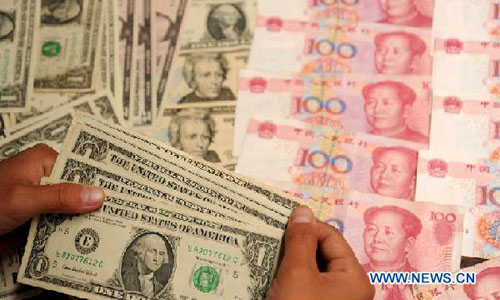China's monetary policies to remain unchanged, but yuan pressured to rise following Fed's decision to keep rate at near-zero level
By Xie Jun Source: Global Times Published: 2020/9/17 11:59:22

A citizen counts the US dollars in Houma City, north China's Shanxi Province, Oct. 11, 2011. The Chinese currency renminbi, or the yuan, strengthened 103 basis points to a record high of 6.3483 against the US dollar on Tuesday, according to the China Foreign Exchange Trading system.Photo: Xinhua
Following the US Federal Reserve's move to keep the interest rate unchanged at a near-zero level, the yuan might be pressured to appreciate further in the short term, while China's monetary policies are likely to be stable, experts said.
US Federal Reserve has announced that it would keep short-term rates targeted at 0-0.25 percent, while Fed officials also expected to leave the rates near zero for years, through at least 2023, and will tolerate periods of higher inflation as they try to revive the US economy.
The low interest rate level wouldn't support the greenback, and it's likely that the yuan will be under pressure to appreciate further in the short term, Liu Xuezhi, a macroeconomics expert at Bank of Communications, told the Global Times on Thursday.
The yuan has already showed a rising trend against the greenback in recent months, as the widening spread between yuan and US dollar is causing overseas investors to speed up allocation of yuan-denominated assets.
On Tuesday, the onshore and offshore yuan surged to the highest level in about 16 months. The yuan's central parity rate also rose by 150 basis points to 6.7675 on Thursday.
However, Wu Chaoming, chief economist at Chasing Securities, said that it's not necessary that the yuan would enter an appreciation cycle, as there are many uncertainties that could cause the currency to fluctuate strongly, especially during the US presidential campaign.
"For example, if the US government suddenly takes some extreme measures against China, the yuan would fluctuate intensely. Besides, domestic economic growth still faces uncertainties, as the momentum for such growth is not stable enough," Wu told the Global Times on Thursday.
Experts also noted that China's monetary policies wouldn't alter significantly, and the government wouldn't roll out monetary stimulus policies such as cutting interest rate or the reserve requirement ratio.
"China's economy has shown evident signs of stabilizing, and is expected to achieve medium to high growth in the third quarter. This means that China wouldn't lean toward loose monetary policies in the near term," Liu said.
Wu also noted that US interest rate change is just a reference, instead of a deciding factor, for China's monetary policies. "China's consumer price index would be stable in 2021 with food prices edging down but services prices rising, and such moderate inflation does not support interest rate cut," he said.
China's stock markets fluctuated mildly on Thursday, with the Shanghai Composite Index down 0.41 percent, while the Shenzhen market rose by 0.03 percent to 13,015 points.
Global Times
RELATED ARTICLES:
Posted in: ECONOMY